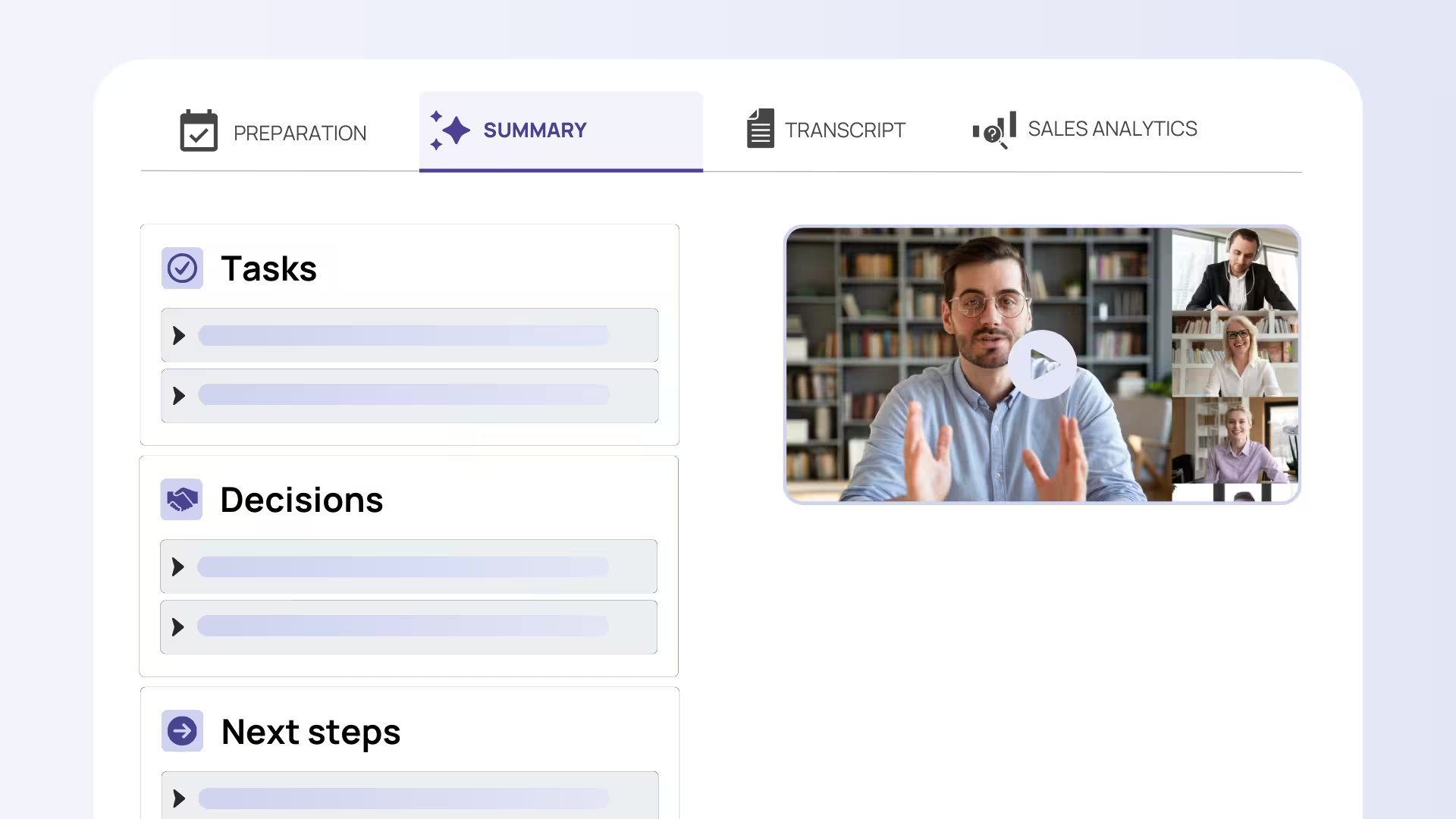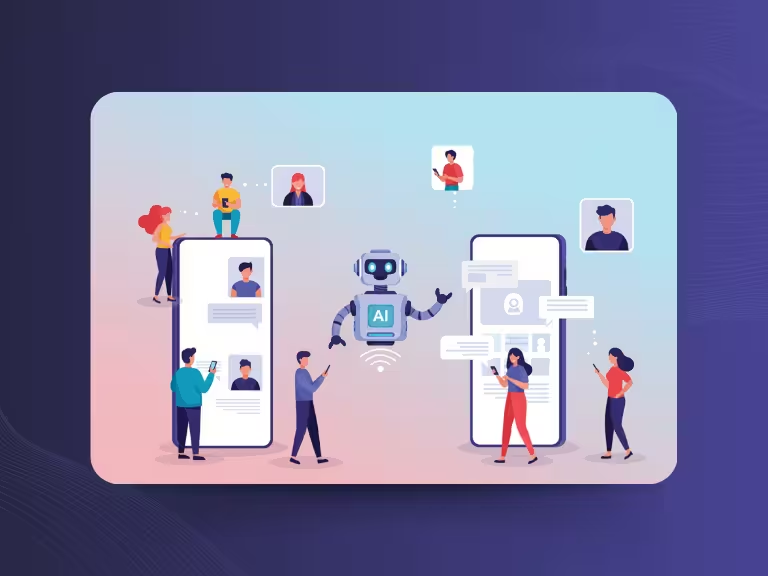Table of Contents
How AI Is Revolutionizing Sales
Artificial Intelligence (AI) is fundamentally transforming the way sales teams operate. In an era where businesses are overwhelmed with growing volumes of data, time-consuming manual tasks and increasingly complex customer needs, AI for Sales offers powerful, future-ready solutions.
From automating repetitive tasks to uncovering precise sales patterns, AI is reshaping modern sales processes and helping teams work smarter, not harder.
In this article, you'll learn how to strategically integrate AI into your sales workflow. We’ll explore practical applications already available, highlight proven tools, and share best practices from companies that are successfully using AI in sales. Along the way, we’ll also take a balanced look at both the opportunities and challenges that come with AI adoption.
The Core Benefits of AI in Sales
1. Automating Repetitive Tasks
One of the biggest advantages of AI in sales is its ability to automate time-consuming routine tasks. Sales reps often spend much of their time on administrative work—scheduling appointments, sending follow-up emails, updating CRM records or preparing reports. These repetitive processes are ideal candidates for AI automation.
The time savings are substantial: According to Gartner research (2024), sales teams can automate 30–40% of their daily admin tasks with AI. That frees up valuable time to focus on what really matters—customer conversations and relationship-building.
A practical example: AI-powered scheduling tools can scan calendars, suggest optimal meeting times and even send confirmations automatically. Meanwhile, CRM data is updated in real time, eliminating the need for manual entry.
2. Lead Scoring and Prioritization
AI-based lead scoring has completely changed how sales teams qualify and prioritize leads. These systems use machine learning to analyze behavioral data, past deal history and customer interactions. The result: predictive scores that indicate how likely a lead is to convert.
The impact is clear: A 2023 Forrester study found that companies using AI-driven lead scoring increased lead-to-close rates by up to 25%. Why? Because AI identifies patterns that are often too complex or subtle for humans to spot.
To implement lead scoring in your CRM, start by defining relevant data sources—website behavior, email open rates, social media interactions, and more. Many modern CRM platforms already offer built-in AI lead scoring features that can be activated with just a few clicks.
3. Data Analysis and Pattern Recognition
One of AI’s core strengths is its ability to process and analyze both structured and unstructured data. While traditional analytics often focused only on CRM data, AI can also evaluate email conversations, social media activity and even spoken interactions from sales calls.
This comprehensive analysis provides deep insights into customer preferences, buying cycles and behavioral trends. AI can spot patterns that suggest the best times to reach out, preferred communication channels or even subtle buying signals.
These insights form the foundation for highly personalized sales strategies—far more effective than generic approaches.

AI for Enhanced Customer Interaction and Smarter Sales Decisions
Personalized Engagement with AI
Personalization is a key driver of successful customer interactions. AI enables businesses to create tailored experiences for each individual—ranging from customized emails to dynamic offers. Chatbots powered by AI can handle first-level inquiries around the clock, while simultaneously gathering important customer data.
In the B2B space, AI can automatically customize sales presentations based on company size, industry, and past interactions—ensuring the most relevant content is presented upfront.
In B2C, personalized communication leads to significantly higher email open rates and conversion rates. When customers feel seen and understood, it fosters deeper loyalty and stronger long-term relationships.
Smarter Decision-Making with Predictive Analytics
Predictive analytics is one of the most powerful AI tools in sales. By analyzing historical data and current behavior, AI can make highly accurate predictions—such as when a customer is most likely to purchase, who’s at risk of churning, or what action should be taken next.
For example: An AI system may detect that a long-term customer has become less engaged. It can then automatically recommend strategies to re-engage them. At the same time, it can identify buying signals from other prospects and suggest the optimal time to make a pitch.
These proactive insights lead to faster response times, higher close rates, and better risk management. Sales teams can focus their energy where it counts most—on high-potential opportunities—while also preempting issues before they escalate.
Successfully Integrating AI into Your Sales Process
Choosing and Implementing the Right AI Tools
When selecting AI tools for sales, modularity and seamless integration with your existing CRM should be top priorities. The best solutions fit naturally into your current systems—no complete infrastructure overhaul needed.
A prime example is Sally, an AI assistant for automated meeting documentation and workflow optimization. Sally joins sales calls, generates detailed meeting notes, identifies action items, and integrates with over 8,000 platforms, including leading CRM tools. This ensures that no customer insight is lost, and follow-ups happen automatically.
Common integration challenges often stem from poor data quality or inconsistent workflows. That’s why it’s essential to clean your data and define standardized processes before implementing AI.

Training and Change Management
Even the most advanced AI technology won’t deliver results if your team doesn’t embrace it. That’s why training your sales team is essential—not just on how to use the tools, but on understanding how AI enhances their daily work.
Effective change management involves engaging employees early and addressing their concerns seriously. Many sales professionals worry that AI could replace their roles. It’s critical to communicate that AI is an intelligent assistant—not a competitor—that handles repetitive tasks and frees up time for high-value, customer-focused work.
Best practices include identifying AI champions within the team who can act as internal advocates, and introducing new features gradually. This gives employees time to adapt and see the real benefits in action.
Data Protection and Ethical Considerations
GDPR compliance is non-negotiable when using AI in sales. Customer data must be handled securely, and data processing must be transparent and auditable. This means AI systems should be able to explain how decisions are made—especially in lead scoring or customer segmentation.
Another critical issue is bias in AI algorithms. If training data is unbalanced or reflects historical bias, AI outputs can become discriminatory. Regular reviews and algorithmic adjustments are essential to ensure fairness and accuracy.
Building trust through transparency is key. Customers should know when they’re interacting with AI, and there should always be the option to speak with a human representative. The same applies internally—sales teams need to feel confident in how AI is being used.
ROI, Long-Term Benefits & the Future of AI in Sales
Measuring Success and Return on Investment (ROI)
To assess the impact of AI in sales, set clear KPIs that reflect both quantitative and qualitative outcomes. Important metrics include:
- Time-to-close
- Conversion rate
- Customer lifetime value
- Sales productivity
Studies show that most AI investments in sales deliver a positive ROI within 1–2 years. The most effective gains come from combining automation with smarter lead management. Many businesses report ROI improvements of 15–35% within the first year of implementation.
To ensure accurate measurement, define baseline metrics before introducing AI, and conduct regular performance reviews. Be sure to consider both direct results (e.g. more closed deals) and indirect benefits (e.g. time savings, increased employee satisfaction).

Continuous Improvement Through Feedback Systems
Modern AI systems in sales are designed to learn and evolve continuously. Every customer interaction, closed deal or lost opportunity becomes a learning input. This feedback loop is what sets advanced AI apart from static tools.
A real-world example: AI learns from successful sales calls which arguments, approaches and timing yield the best results. These insights are then applied to future recommendations, improving conversion rates over time.
The true power of learning systems lies in their adaptability. They can respond to changing market dynamics and even develop new sales strategies—without requiring manual reprogramming.
Looking Ahead: Sustainability and Advanced AI Solutions
A growing trend is the integration of AI in sales with sustainability goals. More accurate demand forecasting helps reduce overproduction and optimize resource use—supporting environmentally conscious business practices while also cutting costs.
The future of AI in sales will bring smarter, more ethical and more autonomous systems. These tools will not only react to data, but proactively identify market opportunities and recommend strategies. They’ll also become more transparent and explainable, increasing trust among both teams and customers.
Companies that adopt AI strategically and responsibly will gain a significant competitive edge—working more efficiently while delivering more innovative solutions to their clients.
Conclusion
AI for Sales offers immense potential to transform sales processes. The biggest opportunities lie in automating repetitive tasks, smart lead prioritization and personalized customer engagement. At the same time, businesses must address challenges like data privacy, ethical considerations and user adoption.
The key to success is a holistic approach—combining cutting-edge technology with training and ethical best practices. AI should be viewed as an empowering assistant, not a replacement. The blend of human insight and AI intelligence creates the most powerful sales teams.
Looking ahead, the strategic and responsible use of AI will be a major success factor. Companies that begin adopting AI now—while aligning with both technical and ethical standards—will be ahead in an increasingly competitive market.
The time for AI in sales is now. The only question is: how will you use it to drive your sales success?



Try meeting transcription now!
Experience how effortless meeting notes can be – try Sally free for 4 weeks. No credit card required.
Test NowOr: Arrange a Demo Appointment




